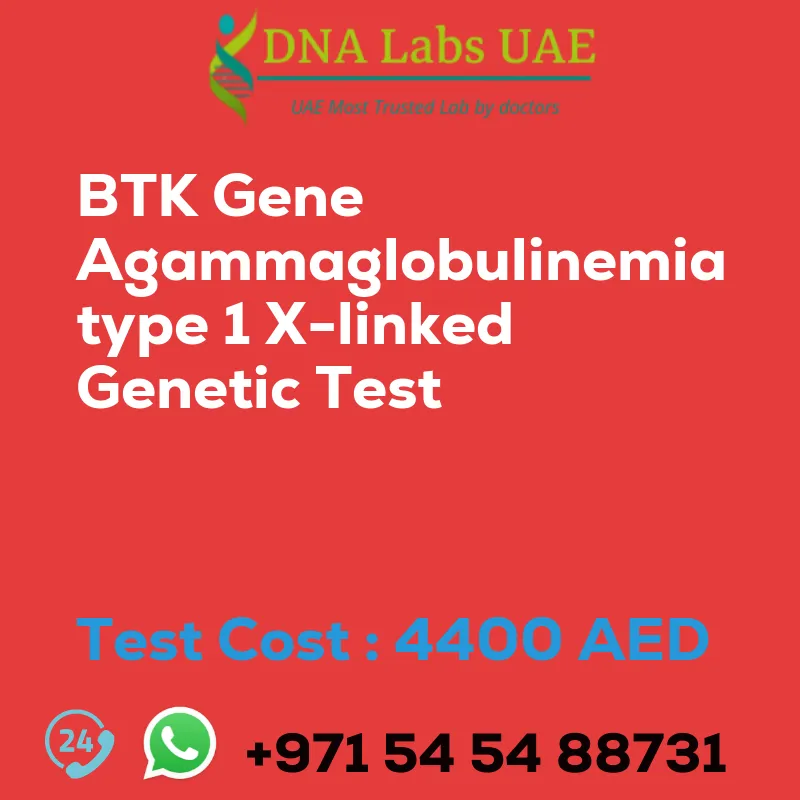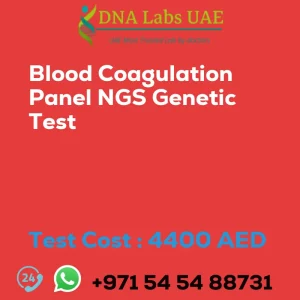BTK Gene Agammaglobulinemia type 1 X-linked Genetic Test
At DNA Labs UAE, we offer the BTK Gene Agammaglobulinemia type 1 X-linked Genetic Test. This test is designed to analyze the BTK gene and identify any genetic variations or mutations that may be causing agammaglobulinemia type 1, a genetic disorder characterized by a lack of B cells and a weakened immune system.
Test Components and Price
The BTK Gene Agammaglobulinemia type 1 X-linked Genetic Test is priced at 4400.0 AED. The test requires a blood sample or extracted DNA, or one drop of blood on an FTA card.
Report Delivery and Method
Once the sample is collected, the report will be delivered within 3 to 4 weeks. The test is performed using NGS (Next-Generation Sequencing) technology, a technique used to analyze the DNA sequence of genes.
Test Type and Doctor
The BTK Gene Agammaglobulinemia type 1 X-linked Genetic Test falls under the category of Hematology. The test is conducted by a Hematologist in our Genetics department.
Pre Test Information
Before undergoing the BTK Gene Agammaglobulinemia type 1 X-linked Genetic Test, it is important to provide the clinical history of the patient. Additionally, a Genetic Counselling session will be conducted to draw a pedigree chart of family members affected by the BTK Gene Agammaglobulinemia type 1.
Test Details
The BTK gene is responsible for producing a protein called Bruton’s tyrosine kinase (BTK), which is crucial for the development and functioning of B cells, a type of immune cell. Agammaglobulinemia type 1 is a genetic disorder that occurs when there is a lack of B cells and an inability to produce antibodies, resulting in a weakened immune system.
NGS genetic testing, using Next-Generation Sequencing technology, is employed to analyze the DNA sequence of the BTK gene. This helps identify any genetic variations or mutations that may be causing agammaglobulinemia type 1. The test can be performed using a blood sample or a saliva sample. The DNA is extracted from the sample and sequenced using NGS technology.
The resulting DNA sequence data is then analyzed to identify any mutations or variations in the BTK gene that may be responsible for the disease. This information is valuable for diagnostic purposes, confirming a suspected diagnosis of agammaglobulinemia type 1, and for genetic counseling to assess the risk of passing on the condition to future generations.
NGS genetic testing can also assist in treatment decisions, as targeted therapies or stem cell transplantation may be beneficial for some individuals with agammaglobulinemia type 1.
It is important to note that NGS genetic testing is a complex process that requires specialized equipment and expertise. Therefore, it is typically performed in specialized genetic testing laboratories or medical centers with genetic testing capabilities. Our healthcare providers and genetic counselors are available to determine if NGS genetic testing is appropriate for you and provide guidance on how to proceed.
| Test Name | BTK Gene Agammaglobulinemia type 1 X-linked Genetic Test |
|---|---|
| Components | |
| Price | 4400.0 AED |
| Sample Condition | Blood or Extracted DNA or One drop Blood on FTA Card |
| Report Delivery | 3 to 4 Weeks |
| Method | NGS Technology |
| Test type | Hematology |
| Doctor | Hematologist |
| Test Department: | Genetics |
| Pre Test Information | Clinical History of Patient who is going for BTK Gene Agammaglobulinemia type 1, X-linked NGS Genetic DNA Test. A Genetic Counselling session to draw a pedigree chart of family members affected with BTK Gene Agammaglobulinemia type 1, X-linked NGS Genetic DNA Test gene BTK |
| Test Details |
The BTK gene is responsible for producing a protein called Bruton’s tyrosine kinase (BTK), which is important for the normal development and functioning of immune cells called B cells. Agammaglobulinemia type 1 is a genetic disorder characterized by a lack of B cells and the inability to produce antibodies, leading to a weakened immune system. NGS (Next-Generation Sequencing) genetic testing is a technique used to analyze the DNA sequence of genes, including the BTK gene, to identify any genetic variations or mutations that may be causing a particular disease or condition. In the case of agammaglobulinemia type 1, NGS genetic testing can identify mutations in the BTK gene that result in the loss or dysfunction of BTK protein, leading to the disease. NGS genetic testing for agammaglobulinemia type 1 can be done through a blood sample or a saliva sample. The DNA is extracted from the sample and sequenced using NGS technology. The resulting DNA sequence data is then analyzed to identify any mutations or variations in the BTK gene that may be causing the disease. The information obtained from NGS genetic testing can be used for diagnostic purposes, to confirm a suspected diagnosis of agammaglobulinemia type 1, and for genetic counseling, to assess the risk of passing on the condition to future generations. It can also help guide treatment decisions, as some individuals with agammaglobulinemia type 1 may benefit from targeted therapies or stem cell transplantation. It is important to note that NGS genetic testing is a complex process that requires specialized equipment and expertise. It is typically performed in specialized genetic testing laboratories or medical centers with genetic testing capabilities. A healthcare provider or genetic counselor can help determine if NGS genetic testing is appropriate and provide guidance on how to proceed. |








